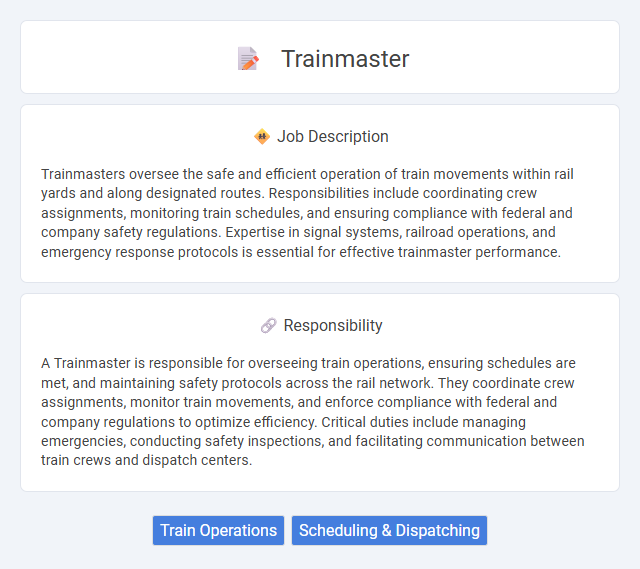
Trainmasters oversee the safe and efficient operation of train movements within rail yards and along designated routes. Responsibilities include coordinating crew assignments, monitoring train schedules, and ensuring compliance with federal and company safety regulations. Expertise in signal systems, railroad operations, and emergency response protocols is essential for effective trainmaster performance.
Individuals with strong communication skills and a keen eye for safety protocols are likely suitable for a Trainmaster role, as overseeing crew performance and operational procedures is crucial. Those who thrive under pressure and exhibit strong leadership qualities probably find this job fulfilling, given the responsibility for timely and secure train operations. Candidates who struggle with multitasking or managing high-stress environments might face challenges adapting to this demanding position.
Qualification
A Trainmaster must possess extensive knowledge of railroad operations, strong leadership skills, and the ability to enforce safety regulations effectively. Qualifications typically include a high school diploma or equivalent, substantial experience in train operations or railroad management, and certification from relevant transportation authorities. Proficiency in communication, problem-solving, and emergency response procedures remains essential for successful job performance.
Responsibility
A Trainmaster is responsible for overseeing train operations, ensuring schedules are met, and maintaining safety protocols across the rail network. They coordinate crew assignments, monitor train movements, and enforce compliance with federal and company regulations to optimize efficiency. Critical duties include managing emergencies, conducting safety inspections, and facilitating communication between train crews and dispatch centers.
Benefit
Trainmasters likely receive significant benefits including competitive salaries, comprehensive health insurance, and retirement plans. They probably gain valuable experience in crew management and train operations, which could enhance career advancement opportunities. The role might also offer job stability and paid time off, contributing to overall employee satisfaction.
Challenge
The Trainmaster job likely involves managing complex train operations and ensuring safety compliance, requiring strong problem-solving skills. Candidates probably face challenges such as coordinating schedules, handling unforeseen delays, and maintaining strict adherence to regulations. High-pressure decision-making and effective communication might be essential to overcome operational obstacles efficiently.
Career Advancement
Trainmasters play a pivotal role in railway operations, overseeing train movements and ensuring safety compliance. Career advancement opportunities often lead to senior supervisory roles such as Superintendent or Operations Manager, where strategic decision-making and team leadership are emphasized. Gaining certifications in railway safety and operational management further enhances prospects for promotion within major rail networks.
Key Terms
Train Operations
Trainmasters oversee train operations, ensuring the safe and efficient movement of trains across rail networks. They coordinate schedules, manage crew assignments, and enforce compliance with safety regulations to minimize delays and accidents. Proficiency in train dispatch systems, operational protocols, and emergency response procedures is essential for optimizing train performance and reliability.
Scheduling & Dispatching
Trainmasters oversee the scheduling and dispatching of train crews to ensure on-time departures and arrivals, optimizing operational efficiency. They coordinate train movements by communicating with dispatchers, engineers, and conductors, maintaining safety protocols and regulatory compliance. Efficient scheduling and real-time dispatch adjustments minimize delays and maximize resource utilization in rail operations.
 kuljobs.com
kuljobs.com